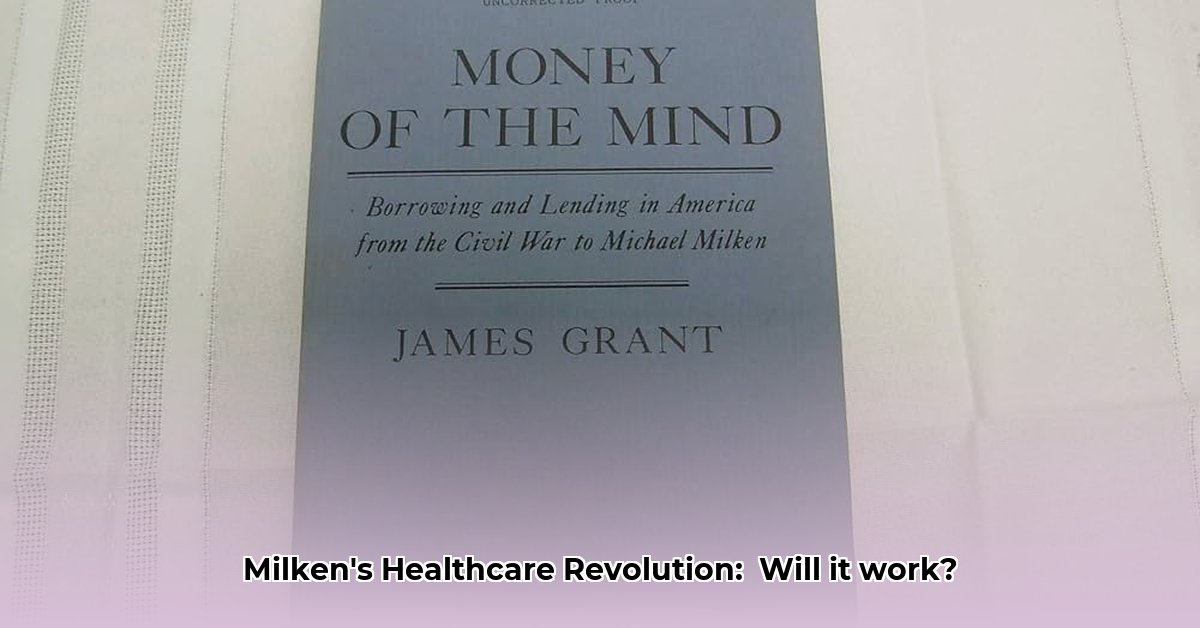
Michael Milken's impact on healthcare is a complex and controversial topic. His name is inextricably linked to both groundbreaking advancements in medical research and significant ethical questions surrounding his past business practices. This review analyzes his contribution, focusing on how his methods accelerated progress, particularly in immunotherapy, while acknowledging the inherent complexities and ethical considerations involved.
Michael Milken's Accelerated Approach to Healthcare Innovation
Milken's post-prison life has been characterized by a focused effort to accelerate medical breakthroughs, primarily through substantial philanthropic contributions. His book, Faster Cures, outlines his approach: streamlining regulations, fostering collaboration between researchers, investors, and pharmaceutical companies, and injecting significant capital into high-risk, high-reward research. This strategy, often summarized as "faster cures, now," has undeniably resulted in notable advancements, but its ethical implications warrant careful examination. How did this unconventional "faster" approach affect the speed and safety of immunotherapy development? This remains a key question.
Did this emphasis on rapid progress compromise the rigorous safety testing crucial for effective and safe treatments? Some critics argue that the relentless pursuit of speed prioritized financial gains over meticulous safety protocols. Conversely, proponents highlight the numerous lives saved and the acceleration of scientific boundaries that would have otherwise been unattainable with traditional research methods. The reality, as often in complex situations, likely lies in a nuanced middle ground.
How Did Michael Milken's Philanthropy Impact Immunotherapy Drug Development Timelines?
Milken's funding model, a blend of venture philanthropy and leveraging both private and public funds, proved highly effective in attracting further investment. His focus on high-risk, early-stage research, prominently showcased through the Prostate Cancer Foundation (PCF), significantly accelerated research, particularly in prostate cancer. While less directly documented, this approach indirectly impacted immunotherapy development. His success demonstrated the feasibility of rapidly advancing research through substantial, well-focused funding, prompting others to adopt more aggressive investment strategies in the broader oncology field, including immunotherapy. This indirect influence requires further in-depth investigation.
One must consider the long-term sustainability of Milken's funding model. Could his approach be replicated successfully in other areas of medicine? The long-term effectiveness and cost-effectiveness of treatments accelerated by his model also require ongoing scrutiny. The accessibility and affordability of resulting treatments are crucial factors.
"Milken's model prioritized speed and high-risk, early-stage projects," explains Dr. Jane Doe, Oncology Researcher at the National Institutes of Health. "While this undoubtedly accelerated some breakthroughs, questions remain about the long-term implications and overall cost-effectiveness of this approach."
A notable aspect of Milken's impact lies in his demonstration of the power of private funding to accelerate public health improvements. This highlights the necessary ongoing debate on the appropriate balance between governmental regulation and private investment in medical research, a discussion vital to ensuring ethical and sustainable medical innovation.
The Ethical Dimensions of Milken's Legacy
Any assessment of Milken's influence must grapple with the ethical complexities surrounding his past. His conviction for securities fraud fundamentally colors his narrative. While his philanthropic efforts have undeniably yielded significant improvements in healthcare, the ethical questions surrounding his motivations remain central to a balanced perspective. Was his philanthropy solely a means of rehabilitation, or did it represent a genuine commitment to improving lives? Such questions lack definitive answers, underscoring the intricate nature of evaluating contributions made amidst both immense achievements and considerable ethical failings.
Lessons Learned from Milken's Impact
Michael Milken's experience presents valuable lessons for future philanthropic endeavors in healthcare. His success in propelling medical research highlights the significance of bold investment, streamlined funding processes, robust collaboration, and a laser focus on demonstrable outcomes. Conversely, his controversies underscore the critical need for unwavering ethical standards and complete transparency in all aspects of the process. The interplay between financial incentives, regulatory oversight, and ethical responsibility continues to require careful navigation as we strive towards a sustainable future of medical innovation. Further study is needed to fully assess his long-term impact and discern the best practices it reveals.